Organisational Behaviour Report: ALDI and Team Dynamics
VerifiedAdded on 2020/06/06
|13
|4016
|265
Report
AI Summary
This report provides an analysis of organisational behaviour within the context of ALDI, a leading retail company. It explores how organisational culture, politics, and power influence individual and team behaviour, with a focus on the impact on employee performance. The report then delves into content and process theories of motivation, examining how these theories are applied to encourage and improve employee performance. It also contrasts effective and ineffective teams, highlighting key characteristics such as coordination, leadership, and employee relations. The report covers topics like power culture, individual culture, expectancy theory, and equity theory. The report also examines the influence of workplace politics and its effect on the employees. The goal of this report is to provide a comprehensive understanding of organisational behaviour principles and their practical application in a business setting, using ALDI as a case study.
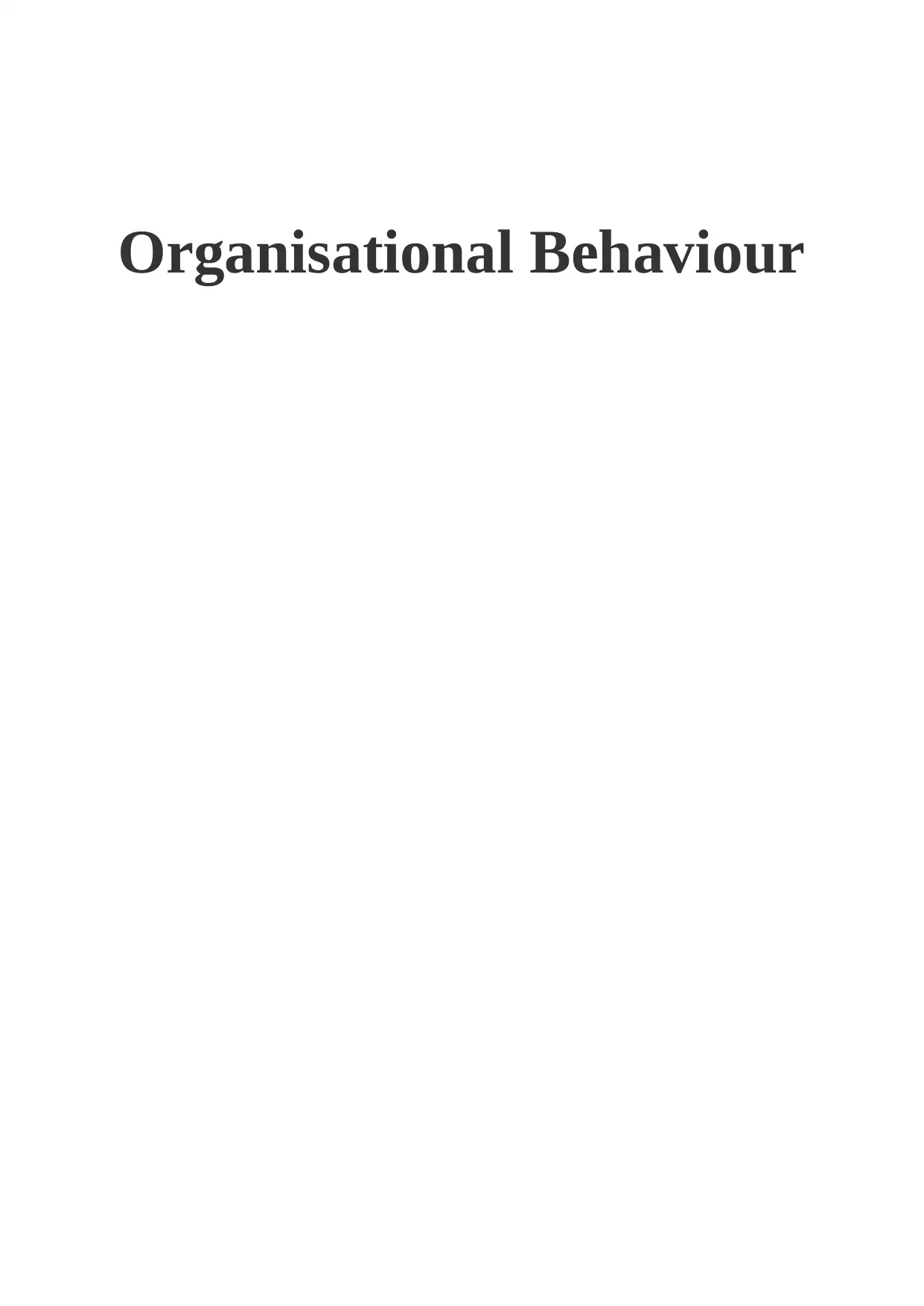
Organisational Behaviour
Paraphrase This Document
Need a fresh take? Get an instant paraphrase of this document with our AI Paraphraser
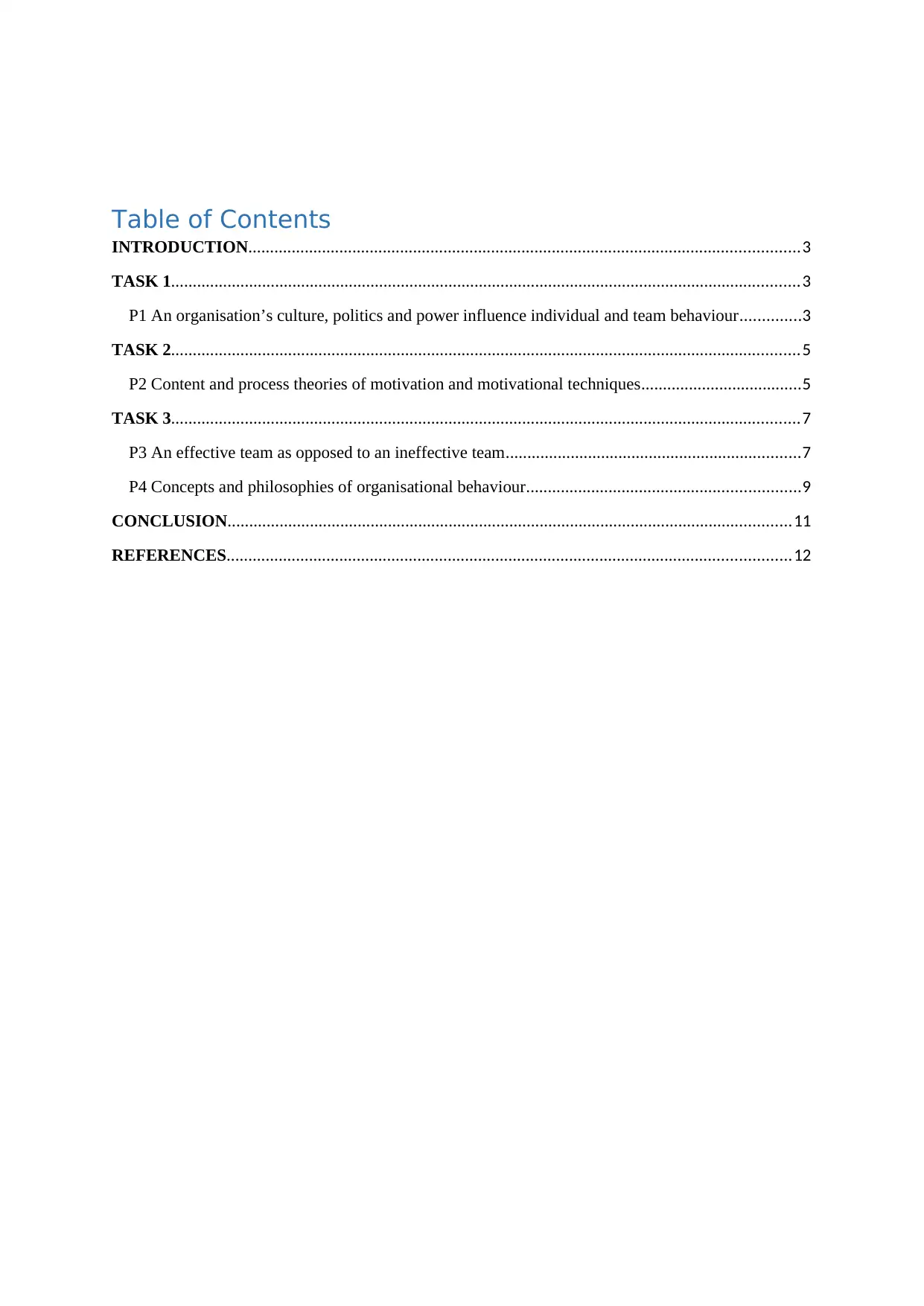
Table of Contents
INTRODUCTION...............................................................................................................................3
TASK 1.................................................................................................................................................3
P1 An organisation’s culture, politics and power influence individual and team behaviour..............3
TASK 2.................................................................................................................................................5
P2 Content and process theories of motivation and motivational techniques.....................................5
TASK 3.................................................................................................................................................7
P3 An effective team as opposed to an ineffective team....................................................................7
P4 Concepts and philosophies of organisational behaviour...............................................................9
CONCLUSION..................................................................................................................................11
REFERENCES..................................................................................................................................12
INTRODUCTION...............................................................................................................................3
TASK 1.................................................................................................................................................3
P1 An organisation’s culture, politics and power influence individual and team behaviour..............3
TASK 2.................................................................................................................................................5
P2 Content and process theories of motivation and motivational techniques.....................................5
TASK 3.................................................................................................................................................7
P3 An effective team as opposed to an ineffective team....................................................................7
P4 Concepts and philosophies of organisational behaviour...............................................................9
CONCLUSION..................................................................................................................................11
REFERENCES..................................................................................................................................12
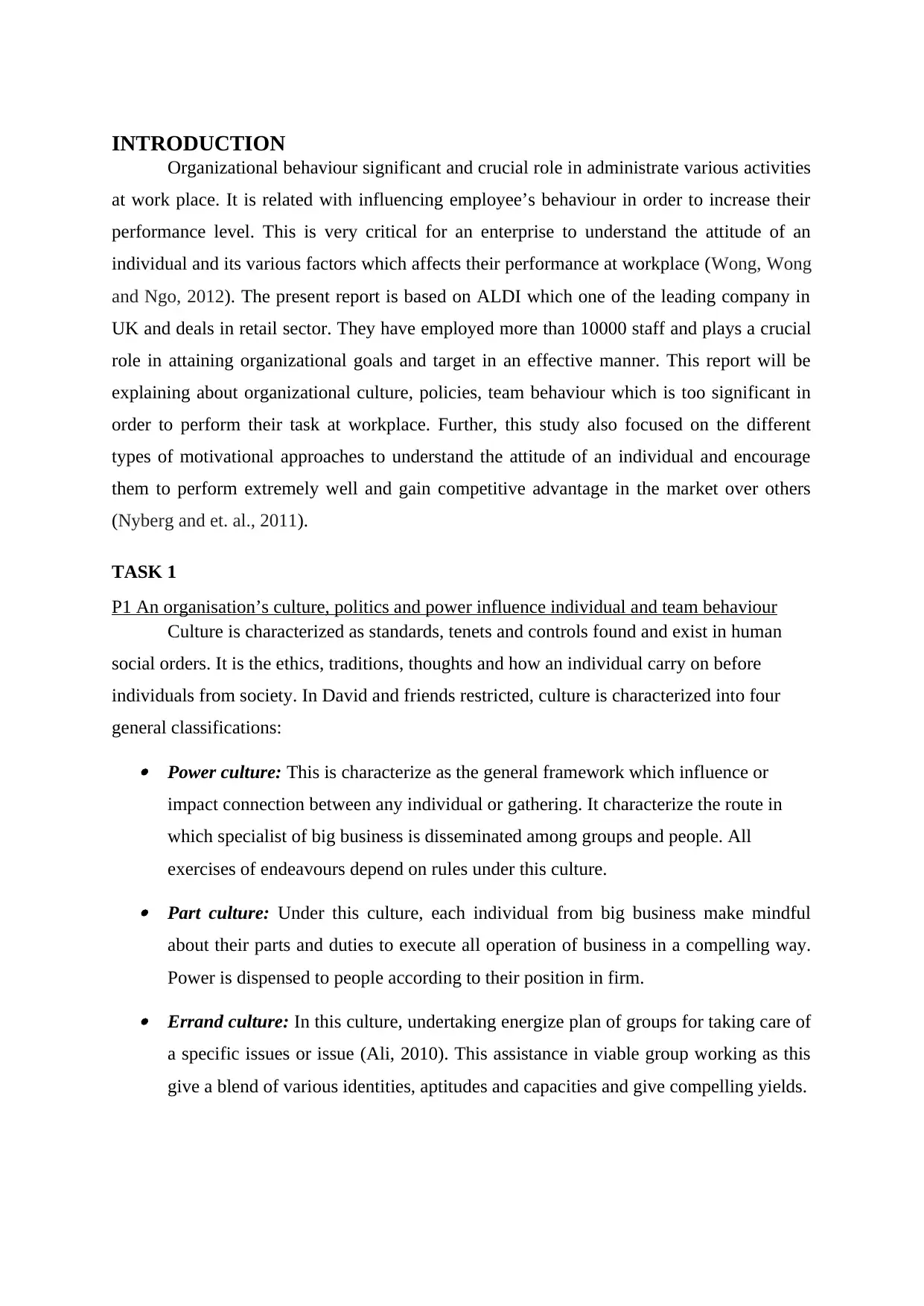
INTRODUCTION
Organizational behaviour significant and crucial role in administrate various activities
at work place. It is related with influencing employee’s behaviour in order to increase their
performance level. This is very critical for an enterprise to understand the attitude of an
individual and its various factors which affects their performance at workplace (Wong, Wong
and Ngo, 2012). The present report is based on ALDI which one of the leading company in
UK and deals in retail sector. They have employed more than 10000 staff and plays a crucial
role in attaining organizational goals and target in an effective manner. This report will be
explaining about organizational culture, policies, team behaviour which is too significant in
order to perform their task at workplace. Further, this study also focused on the different
types of motivational approaches to understand the attitude of an individual and encourage
them to perform extremely well and gain competitive advantage in the market over others
(Nyberg and et. al., 2011).
TASK 1
P1 An organisation’s culture, politics and power influence individual and team behaviour
Culture is characterized as standards, tenets and controls found and exist in human
social orders. It is the ethics, traditions, thoughts and how an individual carry on before
individuals from society. In David and friends restricted, culture is characterized into four
general classifications: Power culture: This is characterize as the general framework which influence or
impact connection between any individual or gathering. It characterize the route in
which specialist of big business is disseminated among groups and people. All
exercises of endeavours depend on rules under this culture. Part culture: Under this culture, each individual from big business make mindful
about their parts and duties to execute all operation of business in a compelling way.
Power is dispensed to people according to their position in firm. Errand culture: In this culture, undertaking energize plan of groups for taking care of
a specific issues or issue (Ali, 2010). This assistance in viable group working as this
give a blend of various identities, aptitudes and capacities and give compelling yields.
Organizational behaviour significant and crucial role in administrate various activities
at work place. It is related with influencing employee’s behaviour in order to increase their
performance level. This is very critical for an enterprise to understand the attitude of an
individual and its various factors which affects their performance at workplace (Wong, Wong
and Ngo, 2012). The present report is based on ALDI which one of the leading company in
UK and deals in retail sector. They have employed more than 10000 staff and plays a crucial
role in attaining organizational goals and target in an effective manner. This report will be
explaining about organizational culture, policies, team behaviour which is too significant in
order to perform their task at workplace. Further, this study also focused on the different
types of motivational approaches to understand the attitude of an individual and encourage
them to perform extremely well and gain competitive advantage in the market over others
(Nyberg and et. al., 2011).
TASK 1
P1 An organisation’s culture, politics and power influence individual and team behaviour
Culture is characterized as standards, tenets and controls found and exist in human
social orders. It is the ethics, traditions, thoughts and how an individual carry on before
individuals from society. In David and friends restricted, culture is characterized into four
general classifications: Power culture: This is characterize as the general framework which influence or
impact connection between any individual or gathering. It characterize the route in
which specialist of big business is disseminated among groups and people. All
exercises of endeavours depend on rules under this culture. Part culture: Under this culture, each individual from big business make mindful
about their parts and duties to execute all operation of business in a compelling way.
Power is dispensed to people according to their position in firm. Errand culture: In this culture, undertaking energize plan of groups for taking care of
a specific issues or issue (Ali, 2010). This assistance in viable group working as this
give a blend of various identities, aptitudes and capacities and give compelling yields.
⊘ This is a preview!⊘
Do you want full access?
Subscribe today to unlock all pages.

Trusted by 1+ million students worldwide

Individual culture: Under this, director concentrate more on satisfy distinctive
necessities and prerequisites of people and everybody in the firm consider themselves
to be one of a kind and innovative.
Mindfulness about the way of life at work environment is extremely fundamental as this
assistance in successful execution of business operations of big business and guarantee ideal
usage of all assets of firm. Governmental issues is the procedure of take choices material to
individuals from gathering. Legislative issues in David and friends restricted is casual and
informal which straightforwardly influence the profitability of firm (Ayyagari, Grover and
Purvis, 2011). Laborers who don't have faith in diligent work and rely upon legislative issues
to influence their position to secure at work environment and pick up gratefulness from their
seniors. Impact of legislative issues on workers and on their execution and conduct can be
comprehended by following focuses: Reduction general efficiency: Politics bring down the execution of individual and
abatement profitability of association. Representatives who play governmental issues
at working environment give careful consideration to their work and they invest more
energy in scrutinize others. As a yield laborers neglects to accomplish their objectives
which make delay in accomplishment of focus by firm. Influence fixation: Due to governmental issues people think that its hard to focus on
their activity and are more inspired by ruin the picture of a people before its bosses.
At the point when specialists get more associated with governmental issues than they
commit more errors because of absence of focus on their work.
Change the state of mind of representatives: One of the principle impact of
legislative issues is that it change the disposition of labourers. Inward governmental
issues at work environment don't enable specialist to give their best to big business.
M1
In today's environment individuals are much worry about than just completing their
assigned task. Organisational culture, power and politics influence day to day operations as
well as govern the atmosphere within the team members. The amount of impact that they all
are directly reflect the organisation's culture formally as well as informally.
D1
necessities and prerequisites of people and everybody in the firm consider themselves
to be one of a kind and innovative.
Mindfulness about the way of life at work environment is extremely fundamental as this
assistance in successful execution of business operations of big business and guarantee ideal
usage of all assets of firm. Governmental issues is the procedure of take choices material to
individuals from gathering. Legislative issues in David and friends restricted is casual and
informal which straightforwardly influence the profitability of firm (Ayyagari, Grover and
Purvis, 2011). Laborers who don't have faith in diligent work and rely upon legislative issues
to influence their position to secure at work environment and pick up gratefulness from their
seniors. Impact of legislative issues on workers and on their execution and conduct can be
comprehended by following focuses: Reduction general efficiency: Politics bring down the execution of individual and
abatement profitability of association. Representatives who play governmental issues
at working environment give careful consideration to their work and they invest more
energy in scrutinize others. As a yield laborers neglects to accomplish their objectives
which make delay in accomplishment of focus by firm. Influence fixation: Due to governmental issues people think that its hard to focus on
their activity and are more inspired by ruin the picture of a people before its bosses.
At the point when specialists get more associated with governmental issues than they
commit more errors because of absence of focus on their work.
Change the state of mind of representatives: One of the principle impact of
legislative issues is that it change the disposition of labourers. Inward governmental
issues at work environment don't enable specialist to give their best to big business.
M1
In today's environment individuals are much worry about than just completing their
assigned task. Organisational culture, power and politics influence day to day operations as
well as govern the atmosphere within the team members. The amount of impact that they all
are directly reflect the organisation's culture formally as well as informally.
D1
Paraphrase This Document
Need a fresh take? Get an instant paraphrase of this document with our AI Paraphraser
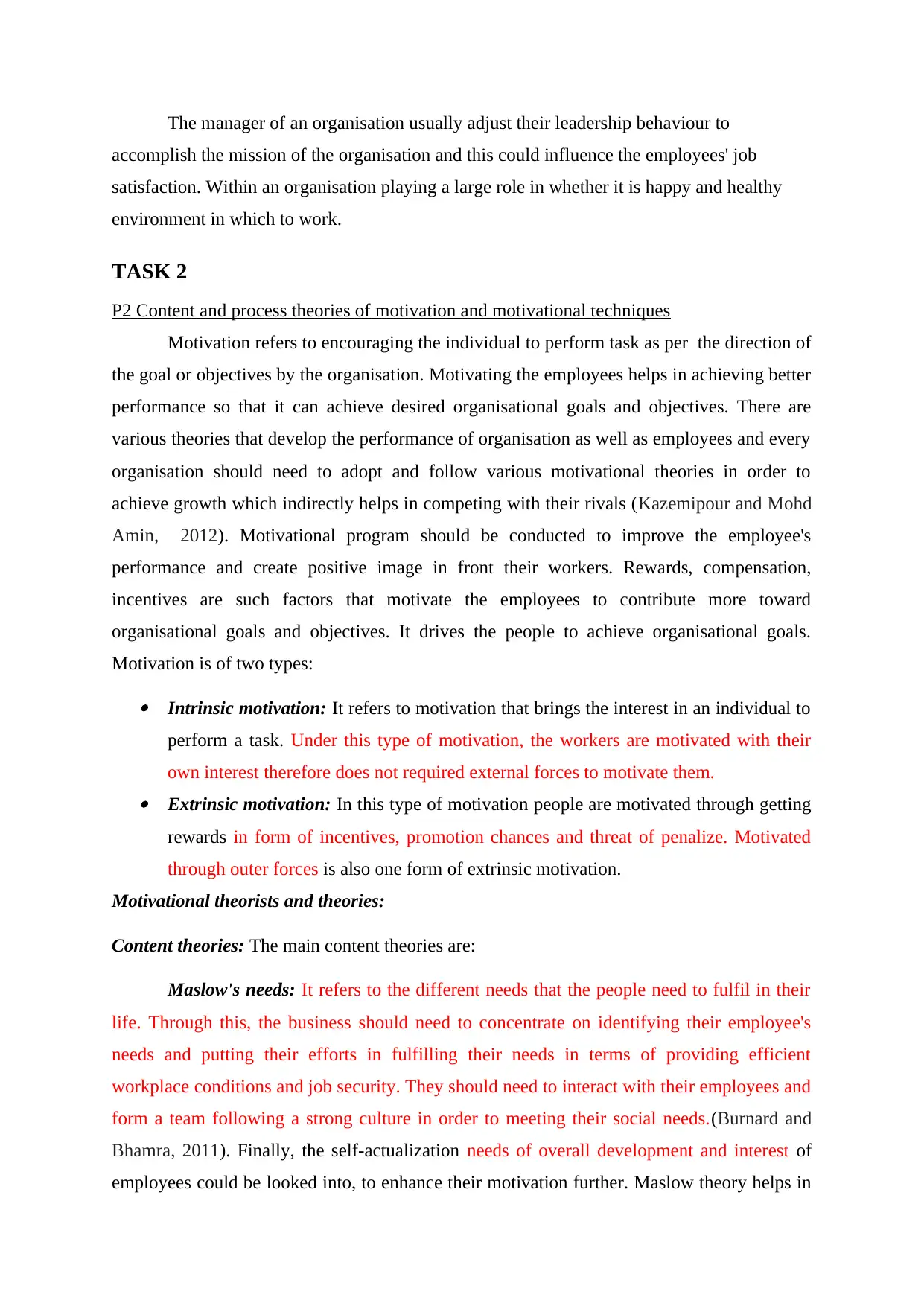
The manager of an organisation usually adjust their leadership behaviour to
accomplish the mission of the organisation and this could influence the employees' job
satisfaction. Within an organisation playing a large role in whether it is happy and healthy
environment in which to work.
TASK 2
P2 Content and process theories of motivation and motivational techniques
Motivation refers to encouraging the individual to perform task as per the direction of
the goal or objectives by the organisation. Motivating the employees helps in achieving better
performance so that it can achieve desired organisational goals and objectives. There are
various theories that develop the performance of organisation as well as employees and every
organisation should need to adopt and follow various motivational theories in order to
achieve growth which indirectly helps in competing with their rivals (Kazemipour and Mohd
Amin, 2012). Motivational program should be conducted to improve the employee's
performance and create positive image in front their workers. Rewards, compensation,
incentives are such factors that motivate the employees to contribute more toward
organisational goals and objectives. It drives the people to achieve organisational goals.
Motivation is of two types: Intrinsic motivation: It refers to motivation that brings the interest in an individual to
perform a task. Under this type of motivation, the workers are motivated with their
own interest therefore does not required external forces to motivate them. Extrinsic motivation: In this type of motivation people are motivated through getting
rewards in form of incentives, promotion chances and threat of penalize. Motivated
through outer forces is also one form of extrinsic motivation.
Motivational theorists and theories:
Content theories: The main content theories are:
Maslow's needs: It refers to the different needs that the people need to fulfil in their
life. Through this, the business should need to concentrate on identifying their employee's
needs and putting their efforts in fulfilling their needs in terms of providing efficient
workplace conditions and job security. They should need to interact with their employees and
form a team following a strong culture in order to meeting their social needs.(Burnard and
Bhamra, 2011). Finally, the self-actualization needs of overall development and interest of
employees could be looked into, to enhance their motivation further. Maslow theory helps in
accomplish the mission of the organisation and this could influence the employees' job
satisfaction. Within an organisation playing a large role in whether it is happy and healthy
environment in which to work.
TASK 2
P2 Content and process theories of motivation and motivational techniques
Motivation refers to encouraging the individual to perform task as per the direction of
the goal or objectives by the organisation. Motivating the employees helps in achieving better
performance so that it can achieve desired organisational goals and objectives. There are
various theories that develop the performance of organisation as well as employees and every
organisation should need to adopt and follow various motivational theories in order to
achieve growth which indirectly helps in competing with their rivals (Kazemipour and Mohd
Amin, 2012). Motivational program should be conducted to improve the employee's
performance and create positive image in front their workers. Rewards, compensation,
incentives are such factors that motivate the employees to contribute more toward
organisational goals and objectives. It drives the people to achieve organisational goals.
Motivation is of two types: Intrinsic motivation: It refers to motivation that brings the interest in an individual to
perform a task. Under this type of motivation, the workers are motivated with their
own interest therefore does not required external forces to motivate them. Extrinsic motivation: In this type of motivation people are motivated through getting
rewards in form of incentives, promotion chances and threat of penalize. Motivated
through outer forces is also one form of extrinsic motivation.
Motivational theorists and theories:
Content theories: The main content theories are:
Maslow's needs: It refers to the different needs that the people need to fulfil in their
life. Through this, the business should need to concentrate on identifying their employee's
needs and putting their efforts in fulfilling their needs in terms of providing efficient
workplace conditions and job security. They should need to interact with their employees and
form a team following a strong culture in order to meeting their social needs.(Burnard and
Bhamra, 2011). Finally, the self-actualization needs of overall development and interest of
employees could be looked into, to enhance their motivation further. Maslow theory helps in
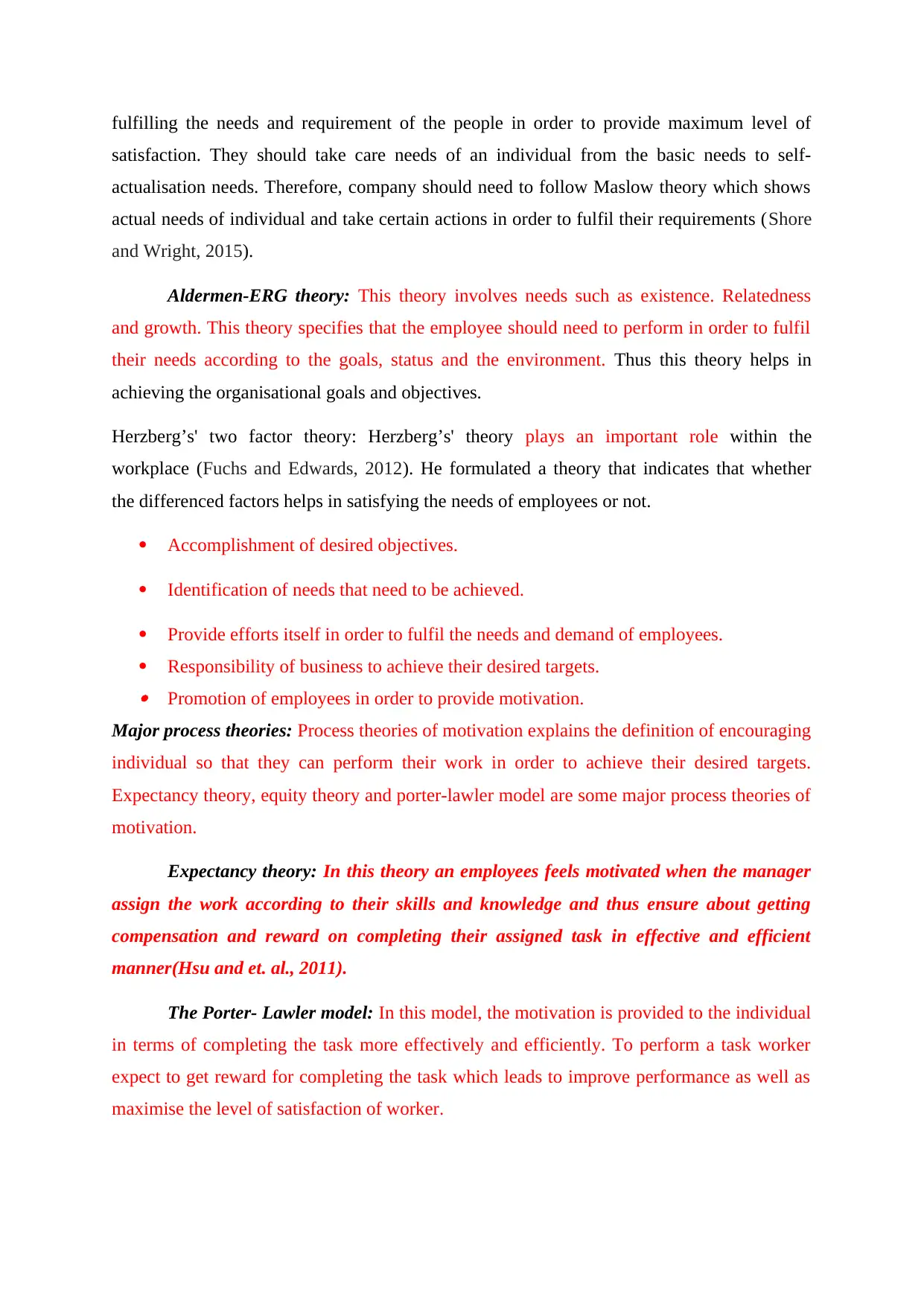
fulfilling the needs and requirement of the people in order to provide maximum level of
satisfaction. They should take care needs of an individual from the basic needs to self-
actualisation needs. Therefore, company should need to follow Maslow theory which shows
actual needs of individual and take certain actions in order to fulfil their requirements (Shore
and Wright, 2015).
Aldermen-ERG theory: This theory involves needs such as existence. Relatedness
and growth. This theory specifies that the employee should need to perform in order to fulfil
their needs according to the goals, status and the environment. Thus this theory helps in
achieving the organisational goals and objectives.
Herzberg’s' two factor theory: Herzberg’s' theory plays an important role within the
workplace (Fuchs and Edwards, 2012). He formulated a theory that indicates that whether
the differenced factors helps in satisfying the needs of employees or not.
Accomplishment of desired objectives.
Identification of needs that need to be achieved.
Provide efforts itself in order to fulfil the needs and demand of employees.
Responsibility of business to achieve their desired targets. Promotion of employees in order to provide motivation.
Major process theories: Process theories of motivation explains the definition of encouraging
individual so that they can perform their work in order to achieve their desired targets.
Expectancy theory, equity theory and porter-lawler model are some major process theories of
motivation.
Expectancy theory: In this theory an employees feels motivated when the manager
assign the work according to their skills and knowledge and thus ensure about getting
compensation and reward on completing their assigned task in effective and efficient
manner(Hsu and et. al., 2011).
The Porter- Lawler model: In this model, the motivation is provided to the individual
in terms of completing the task more effectively and efficiently. To perform a task worker
expect to get reward for completing the task which leads to improve performance as well as
maximise the level of satisfaction of worker.
satisfaction. They should take care needs of an individual from the basic needs to self-
actualisation needs. Therefore, company should need to follow Maslow theory which shows
actual needs of individual and take certain actions in order to fulfil their requirements (Shore
and Wright, 2015).
Aldermen-ERG theory: This theory involves needs such as existence. Relatedness
and growth. This theory specifies that the employee should need to perform in order to fulfil
their needs according to the goals, status and the environment. Thus this theory helps in
achieving the organisational goals and objectives.
Herzberg’s' two factor theory: Herzberg’s' theory plays an important role within the
workplace (Fuchs and Edwards, 2012). He formulated a theory that indicates that whether
the differenced factors helps in satisfying the needs of employees or not.
Accomplishment of desired objectives.
Identification of needs that need to be achieved.
Provide efforts itself in order to fulfil the needs and demand of employees.
Responsibility of business to achieve their desired targets. Promotion of employees in order to provide motivation.
Major process theories: Process theories of motivation explains the definition of encouraging
individual so that they can perform their work in order to achieve their desired targets.
Expectancy theory, equity theory and porter-lawler model are some major process theories of
motivation.
Expectancy theory: In this theory an employees feels motivated when the manager
assign the work according to their skills and knowledge and thus ensure about getting
compensation and reward on completing their assigned task in effective and efficient
manner(Hsu and et. al., 2011).
The Porter- Lawler model: In this model, the motivation is provided to the individual
in terms of completing the task more effectively and efficiently. To perform a task worker
expect to get reward for completing the task which leads to improve performance as well as
maximise the level of satisfaction of worker.
⊘ This is a preview!⊘
Do you want full access?
Subscribe today to unlock all pages.

Trusted by 1+ million students worldwide
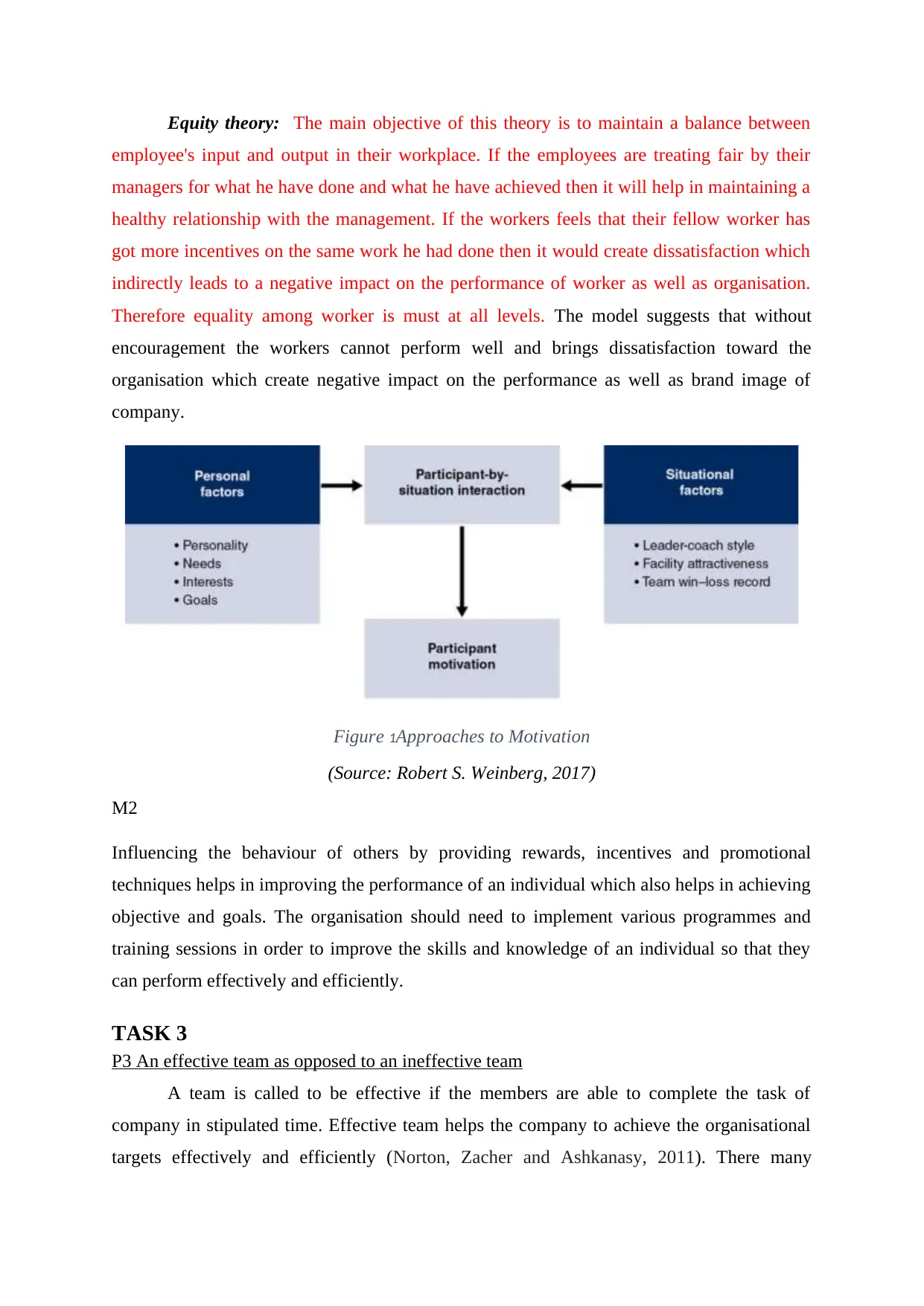
Equity theory: The main objective of this theory is to maintain a balance between
employee's input and output in their workplace. If the employees are treating fair by their
managers for what he have done and what he have achieved then it will help in maintaining a
healthy relationship with the management. If the workers feels that their fellow worker has
got more incentives on the same work he had done then it would create dissatisfaction which
indirectly leads to a negative impact on the performance of worker as well as organisation.
Therefore equality among worker is must at all levels. The model suggests that without
encouragement the workers cannot perform well and brings dissatisfaction toward the
organisation which create negative impact on the performance as well as brand image of
company.
Figure 1Approaches to Motivation
(Source: Robert S. Weinberg, 2017)
M2
Influencing the behaviour of others by providing rewards, incentives and promotional
techniques helps in improving the performance of an individual which also helps in achieving
objective and goals. The organisation should need to implement various programmes and
training sessions in order to improve the skills and knowledge of an individual so that they
can perform effectively and efficiently.
TASK 3
P3 An effective team as opposed to an ineffective team
A team is called to be effective if the members are able to complete the task of
company in stipulated time. Effective team helps the company to achieve the organisational
targets effectively and efficiently (Norton, Zacher and Ashkanasy, 2011). There many
employee's input and output in their workplace. If the employees are treating fair by their
managers for what he have done and what he have achieved then it will help in maintaining a
healthy relationship with the management. If the workers feels that their fellow worker has
got more incentives on the same work he had done then it would create dissatisfaction which
indirectly leads to a negative impact on the performance of worker as well as organisation.
Therefore equality among worker is must at all levels. The model suggests that without
encouragement the workers cannot perform well and brings dissatisfaction toward the
organisation which create negative impact on the performance as well as brand image of
company.
Figure 1Approaches to Motivation
(Source: Robert S. Weinberg, 2017)
M2
Influencing the behaviour of others by providing rewards, incentives and promotional
techniques helps in improving the performance of an individual which also helps in achieving
objective and goals. The organisation should need to implement various programmes and
training sessions in order to improve the skills and knowledge of an individual so that they
can perform effectively and efficiently.
TASK 3
P3 An effective team as opposed to an ineffective team
A team is called to be effective if the members are able to complete the task of
company in stipulated time. Effective team helps the company to achieve the organisational
targets effectively and efficiently (Norton, Zacher and Ashkanasy, 2011). There many
Paraphrase This Document
Need a fresh take? Get an instant paraphrase of this document with our AI Paraphraser
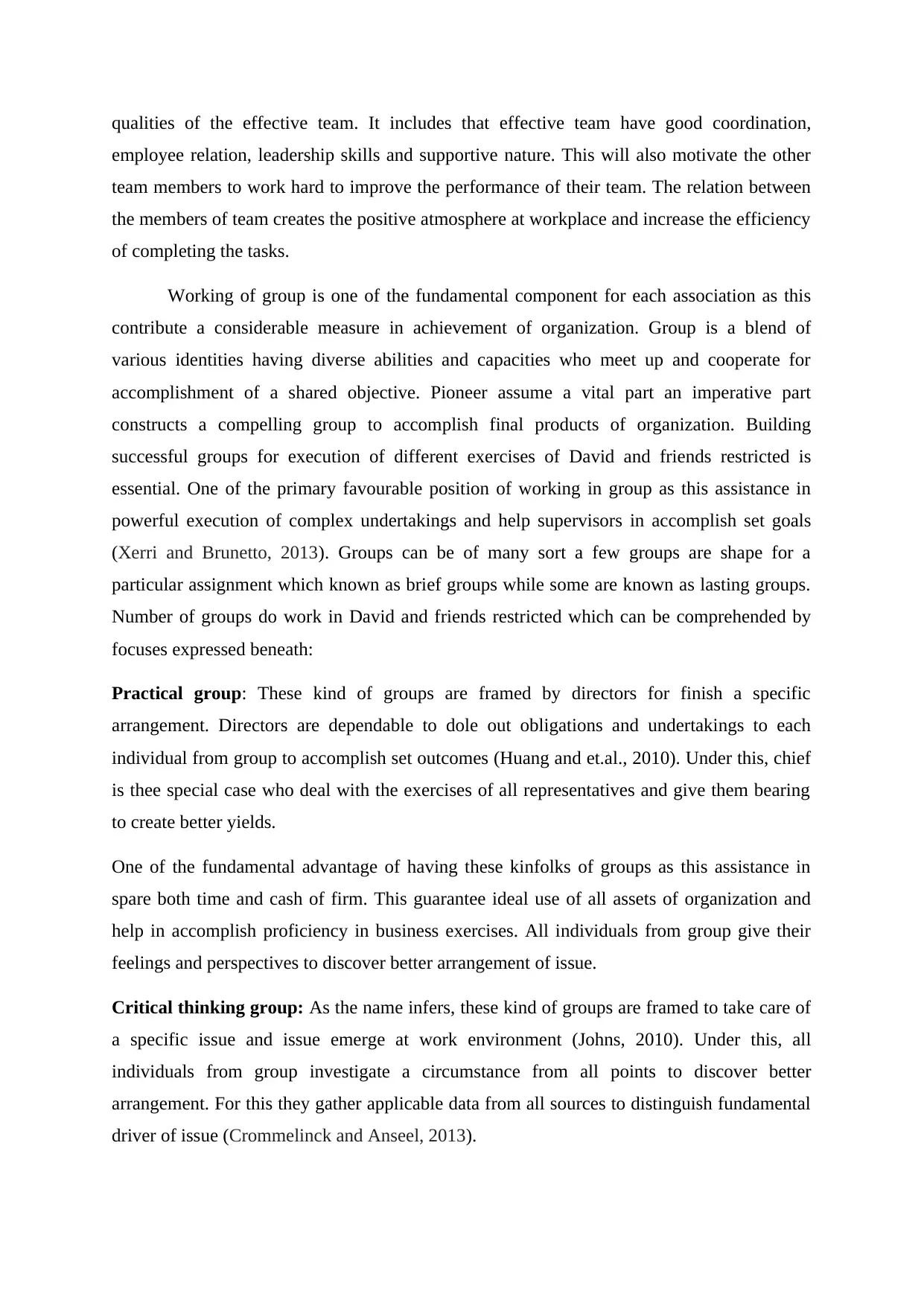
qualities of the effective team. It includes that effective team have good coordination,
employee relation, leadership skills and supportive nature. This will also motivate the other
team members to work hard to improve the performance of their team. The relation between
the members of team creates the positive atmosphere at workplace and increase the efficiency
of completing the tasks.
Working of group is one of the fundamental component for each association as this
contribute a considerable measure in achievement of organization. Group is a blend of
various identities having diverse abilities and capacities who meet up and cooperate for
accomplishment of a shared objective. Pioneer assume a vital part an imperative part
constructs a compelling group to accomplish final products of organization. Building
successful groups for execution of different exercises of David and friends restricted is
essential. One of the primary favourable position of working in group as this assistance in
powerful execution of complex undertakings and help supervisors in accomplish set goals
(Xerri and Brunetto, 2013). Groups can be of many sort a few groups are shape for a
particular assignment which known as brief groups while some are known as lasting groups.
Number of groups do work in David and friends restricted which can be comprehended by
focuses expressed beneath:
Practical group: These kind of groups are framed by directors for finish a specific
arrangement. Directors are dependable to dole out obligations and undertakings to each
individual from group to accomplish set outcomes (Huang and et.al., 2010). Under this, chief
is thee special case who deal with the exercises of all representatives and give them bearing
to create better yields.
One of the fundamental advantage of having these kinfolks of groups as this assistance in
spare both time and cash of firm. This guarantee ideal use of all assets of organization and
help in accomplish proficiency in business exercises. All individuals from group give their
feelings and perspectives to discover better arrangement of issue.
Critical thinking group: As the name infers, these kind of groups are framed to take care of
a specific issue and issue emerge at work environment (Johns, 2010). Under this, all
individuals from group investigate a circumstance from all points to discover better
arrangement. For this they gather applicable data from all sources to distinguish fundamental
driver of issue (Crommelinck and Anseel, 2013).
employee relation, leadership skills and supportive nature. This will also motivate the other
team members to work hard to improve the performance of their team. The relation between
the members of team creates the positive atmosphere at workplace and increase the efficiency
of completing the tasks.
Working of group is one of the fundamental component for each association as this
contribute a considerable measure in achievement of organization. Group is a blend of
various identities having diverse abilities and capacities who meet up and cooperate for
accomplishment of a shared objective. Pioneer assume a vital part an imperative part
constructs a compelling group to accomplish final products of organization. Building
successful groups for execution of different exercises of David and friends restricted is
essential. One of the primary favourable position of working in group as this assistance in
powerful execution of complex undertakings and help supervisors in accomplish set goals
(Xerri and Brunetto, 2013). Groups can be of many sort a few groups are shape for a
particular assignment which known as brief groups while some are known as lasting groups.
Number of groups do work in David and friends restricted which can be comprehended by
focuses expressed beneath:
Practical group: These kind of groups are framed by directors for finish a specific
arrangement. Directors are dependable to dole out obligations and undertakings to each
individual from group to accomplish set outcomes (Huang and et.al., 2010). Under this, chief
is thee special case who deal with the exercises of all representatives and give them bearing
to create better yields.
One of the fundamental advantage of having these kinfolks of groups as this assistance in
spare both time and cash of firm. This guarantee ideal use of all assets of organization and
help in accomplish proficiency in business exercises. All individuals from group give their
feelings and perspectives to discover better arrangement of issue.
Critical thinking group: As the name infers, these kind of groups are framed to take care of
a specific issue and issue emerge at work environment (Johns, 2010). Under this, all
individuals from group investigate a circumstance from all points to discover better
arrangement. For this they gather applicable data from all sources to distinguish fundamental
driver of issue (Crommelinck and Anseel, 2013).
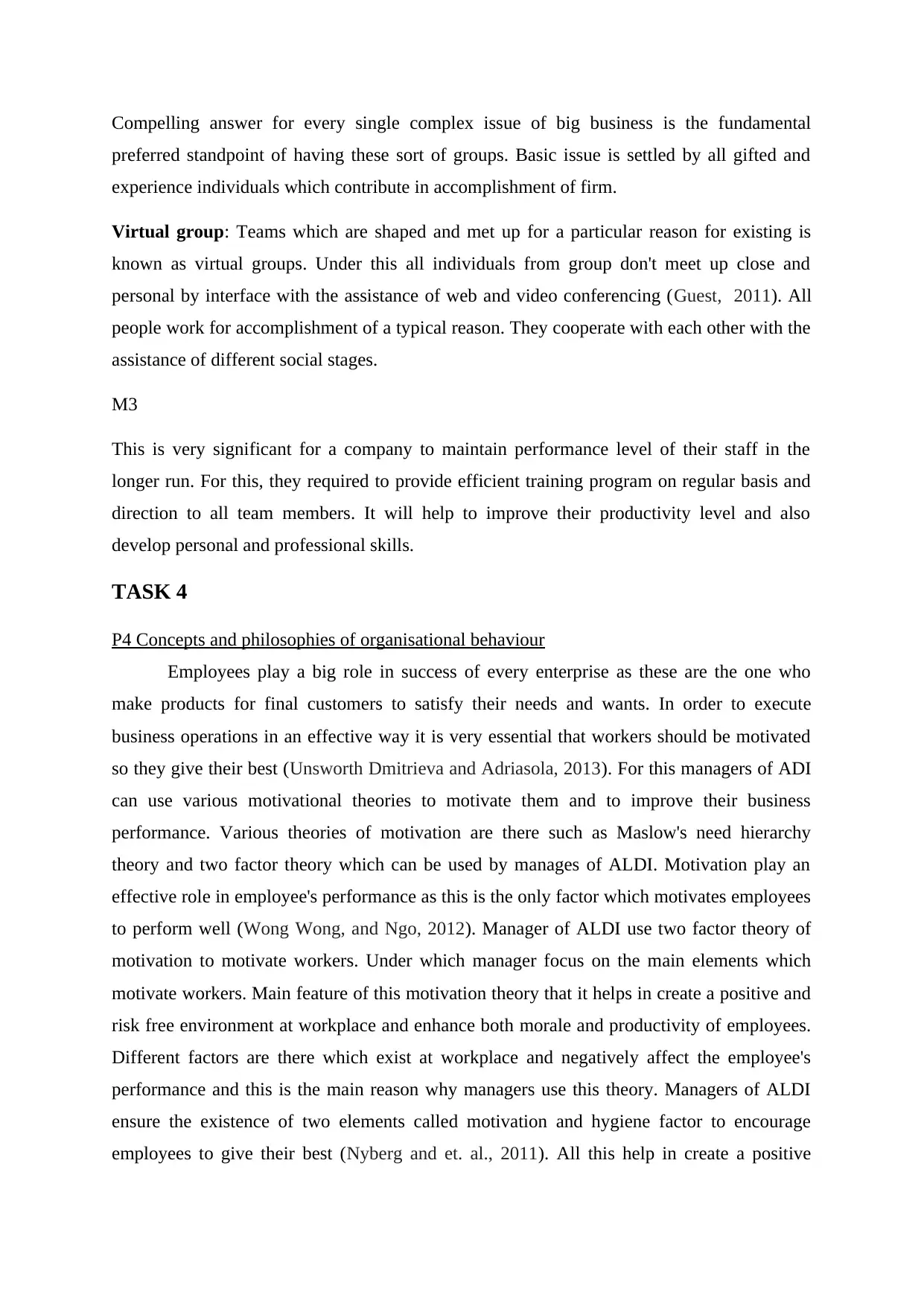
Compelling answer for every single complex issue of big business is the fundamental
preferred standpoint of having these sort of groups. Basic issue is settled by all gifted and
experience individuals which contribute in accomplishment of firm.
Virtual group: Teams which are shaped and met up for a particular reason for existing is
known as virtual groups. Under this all individuals from group don't meet up close and
personal by interface with the assistance of web and video conferencing (Guest, 2011). All
people work for accomplishment of a typical reason. They cooperate with each other with the
assistance of different social stages.
M3
This is very significant for a company to maintain performance level of their staff in the
longer run. For this, they required to provide efficient training program on regular basis and
direction to all team members. It will help to improve their productivity level and also
develop personal and professional skills.
TASK 4
P4 Concepts and philosophies of organisational behaviour
Employees play a big role in success of every enterprise as these are the one who
make products for final customers to satisfy their needs and wants. In order to execute
business operations in an effective way it is very essential that workers should be motivated
so they give their best (Unsworth Dmitrieva and Adriasola, 2013). For this managers of ADI
can use various motivational theories to motivate them and to improve their business
performance. Various theories of motivation are there such as Maslow's need hierarchy
theory and two factor theory which can be used by manages of ALDI. Motivation play an
effective role in employee's performance as this is the only factor which motivates employees
to perform well (Wong Wong, and Ngo, 2012). Manager of ALDI use two factor theory of
motivation to motivate workers. Under which manager focus on the main elements which
motivate workers. Main feature of this motivation theory that it helps in create a positive and
risk free environment at workplace and enhance both morale and productivity of employees.
Different factors are there which exist at workplace and negatively affect the employee's
performance and this is the main reason why managers use this theory. Managers of ALDI
ensure the existence of two elements called motivation and hygiene factor to encourage
employees to give their best (Nyberg and et. al., 2011). All this help in create a positive
preferred standpoint of having these sort of groups. Basic issue is settled by all gifted and
experience individuals which contribute in accomplishment of firm.
Virtual group: Teams which are shaped and met up for a particular reason for existing is
known as virtual groups. Under this all individuals from group don't meet up close and
personal by interface with the assistance of web and video conferencing (Guest, 2011). All
people work for accomplishment of a typical reason. They cooperate with each other with the
assistance of different social stages.
M3
This is very significant for a company to maintain performance level of their staff in the
longer run. For this, they required to provide efficient training program on regular basis and
direction to all team members. It will help to improve their productivity level and also
develop personal and professional skills.
TASK 4
P4 Concepts and philosophies of organisational behaviour
Employees play a big role in success of every enterprise as these are the one who
make products for final customers to satisfy their needs and wants. In order to execute
business operations in an effective way it is very essential that workers should be motivated
so they give their best (Unsworth Dmitrieva and Adriasola, 2013). For this managers of ADI
can use various motivational theories to motivate them and to improve their business
performance. Various theories of motivation are there such as Maslow's need hierarchy
theory and two factor theory which can be used by manages of ALDI. Motivation play an
effective role in employee's performance as this is the only factor which motivates employees
to perform well (Wong Wong, and Ngo, 2012). Manager of ALDI use two factor theory of
motivation to motivate workers. Under which manager focus on the main elements which
motivate workers. Main feature of this motivation theory that it helps in create a positive and
risk free environment at workplace and enhance both morale and productivity of employees.
Different factors are there which exist at workplace and negatively affect the employee's
performance and this is the main reason why managers use this theory. Managers of ALDI
ensure the existence of two elements called motivation and hygiene factor to encourage
employees to give their best (Nyberg and et. al., 2011). All this help in create a positive
⊘ This is a preview!⊘
Do you want full access?
Subscribe today to unlock all pages.

Trusted by 1+ million students worldwide
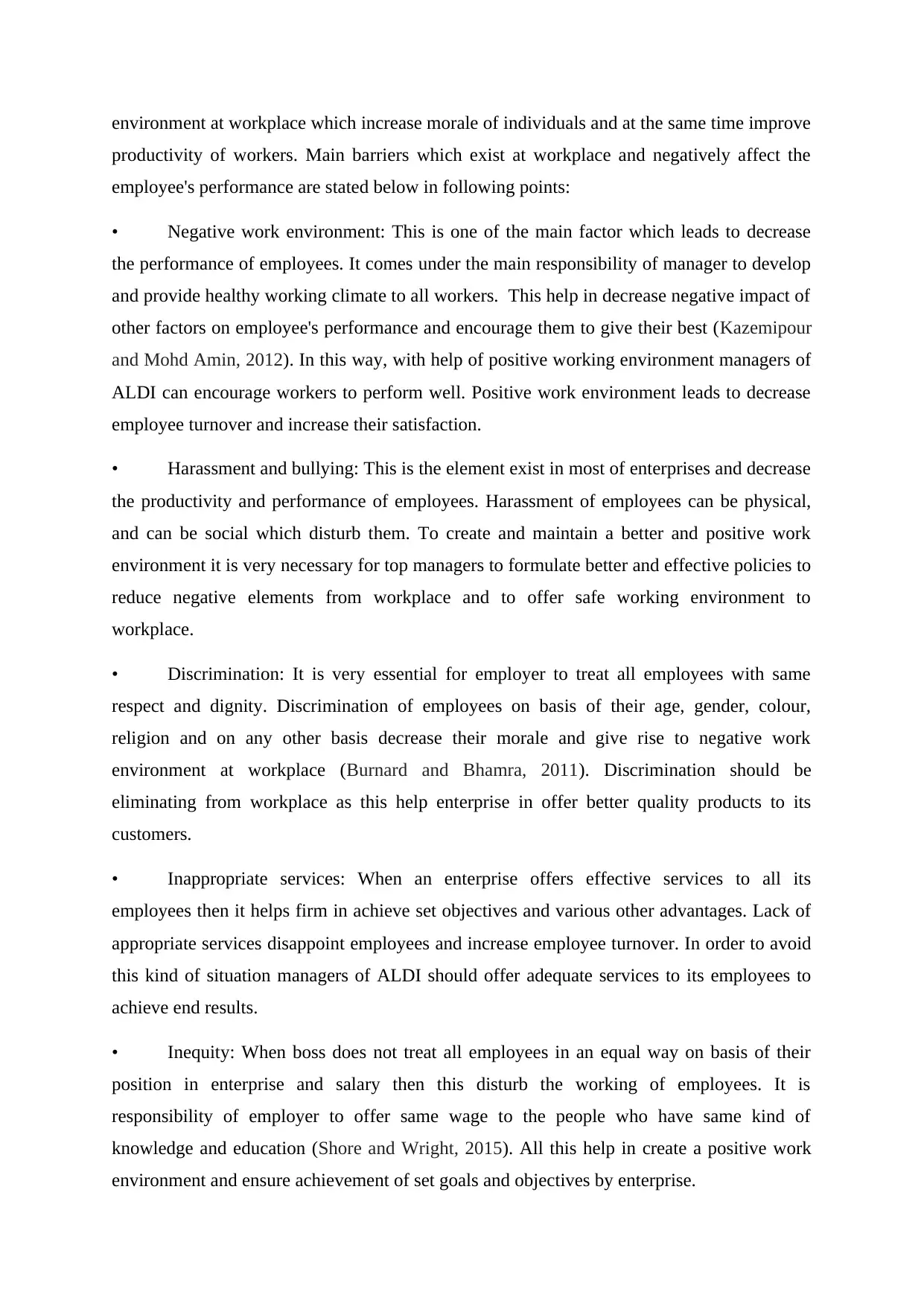
environment at workplace which increase morale of individuals and at the same time improve
productivity of workers. Main barriers which exist at workplace and negatively affect the
employee's performance are stated below in following points:
• Negative work environment: This is one of the main factor which leads to decrease
the performance of employees. It comes under the main responsibility of manager to develop
and provide healthy working climate to all workers. This help in decrease negative impact of
other factors on employee's performance and encourage them to give their best (Kazemipour
and Mohd Amin, 2012). In this way, with help of positive working environment managers of
ALDI can encourage workers to perform well. Positive work environment leads to decrease
employee turnover and increase their satisfaction.
• Harassment and bullying: This is the element exist in most of enterprises and decrease
the productivity and performance of employees. Harassment of employees can be physical,
and can be social which disturb them. To create and maintain a better and positive work
environment it is very necessary for top managers to formulate better and effective policies to
reduce negative elements from workplace and to offer safe working environment to
workplace.
• Discrimination: It is very essential for employer to treat all employees with same
respect and dignity. Discrimination of employees on basis of their age, gender, colour,
religion and on any other basis decrease their morale and give rise to negative work
environment at workplace (Burnard and Bhamra, 2011). Discrimination should be
eliminating from workplace as this help enterprise in offer better quality products to its
customers.
• Inappropriate services: When an enterprise offers effective services to all its
employees then it helps firm in achieve set objectives and various other advantages. Lack of
appropriate services disappoint employees and increase employee turnover. In order to avoid
this kind of situation managers of ALDI should offer adequate services to its employees to
achieve end results.
• Inequity: When boss does not treat all employees in an equal way on basis of their
position in enterprise and salary then this disturb the working of employees. It is
responsibility of employer to offer same wage to the people who have same kind of
knowledge and education (Shore and Wright, 2015). All this help in create a positive work
environment and ensure achievement of set goals and objectives by enterprise.
productivity of workers. Main barriers which exist at workplace and negatively affect the
employee's performance are stated below in following points:
• Negative work environment: This is one of the main factor which leads to decrease
the performance of employees. It comes under the main responsibility of manager to develop
and provide healthy working climate to all workers. This help in decrease negative impact of
other factors on employee's performance and encourage them to give their best (Kazemipour
and Mohd Amin, 2012). In this way, with help of positive working environment managers of
ALDI can encourage workers to perform well. Positive work environment leads to decrease
employee turnover and increase their satisfaction.
• Harassment and bullying: This is the element exist in most of enterprises and decrease
the productivity and performance of employees. Harassment of employees can be physical,
and can be social which disturb them. To create and maintain a better and positive work
environment it is very necessary for top managers to formulate better and effective policies to
reduce negative elements from workplace and to offer safe working environment to
workplace.
• Discrimination: It is very essential for employer to treat all employees with same
respect and dignity. Discrimination of employees on basis of their age, gender, colour,
religion and on any other basis decrease their morale and give rise to negative work
environment at workplace (Burnard and Bhamra, 2011). Discrimination should be
eliminating from workplace as this help enterprise in offer better quality products to its
customers.
• Inappropriate services: When an enterprise offers effective services to all its
employees then it helps firm in achieve set objectives and various other advantages. Lack of
appropriate services disappoint employees and increase employee turnover. In order to avoid
this kind of situation managers of ALDI should offer adequate services to its employees to
achieve end results.
• Inequity: When boss does not treat all employees in an equal way on basis of their
position in enterprise and salary then this disturb the working of employees. It is
responsibility of employer to offer same wage to the people who have same kind of
knowledge and education (Shore and Wright, 2015). All this help in create a positive work
environment and ensure achievement of set goals and objectives by enterprise.
Paraphrase This Document
Need a fresh take? Get an instant paraphrase of this document with our AI Paraphraser
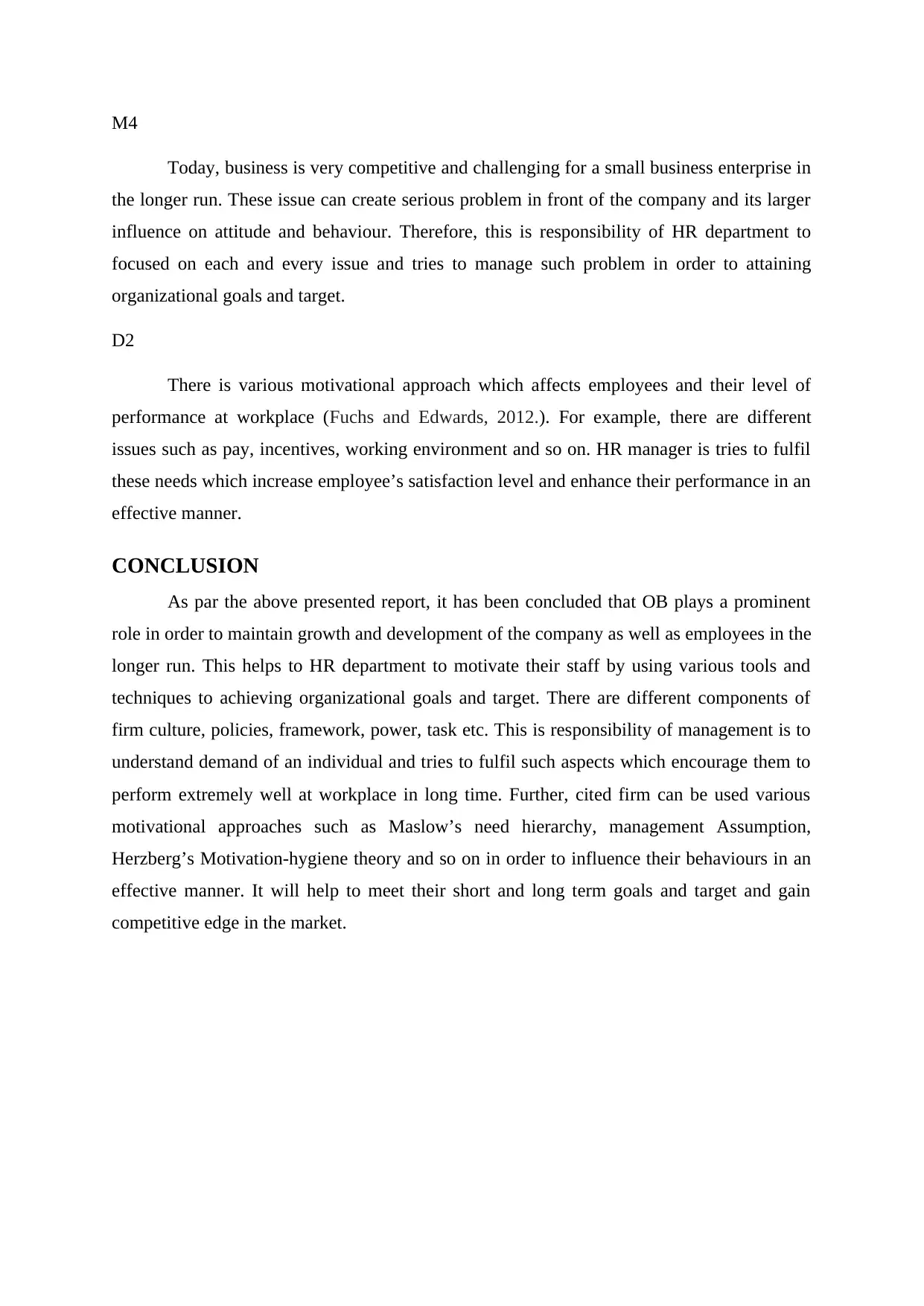
M4
Today, business is very competitive and challenging for a small business enterprise in
the longer run. These issue can create serious problem in front of the company and its larger
influence on attitude and behaviour. Therefore, this is responsibility of HR department to
focused on each and every issue and tries to manage such problem in order to attaining
organizational goals and target.
D2
There is various motivational approach which affects employees and their level of
performance at workplace (Fuchs and Edwards, 2012.). For example, there are different
issues such as pay, incentives, working environment and so on. HR manager is tries to fulfil
these needs which increase employee’s satisfaction level and enhance their performance in an
effective manner.
CONCLUSION
As par the above presented report, it has been concluded that OB plays a prominent
role in order to maintain growth and development of the company as well as employees in the
longer run. This helps to HR department to motivate their staff by using various tools and
techniques to achieving organizational goals and target. There are different components of
firm culture, policies, framework, power, task etc. This is responsibility of management is to
understand demand of an individual and tries to fulfil such aspects which encourage them to
perform extremely well at workplace in long time. Further, cited firm can be used various
motivational approaches such as Maslow’s need hierarchy, management Assumption,
Herzberg’s Motivation-hygiene theory and so on in order to influence their behaviours in an
effective manner. It will help to meet their short and long term goals and target and gain
competitive edge in the market.
Today, business is very competitive and challenging for a small business enterprise in
the longer run. These issue can create serious problem in front of the company and its larger
influence on attitude and behaviour. Therefore, this is responsibility of HR department to
focused on each and every issue and tries to manage such problem in order to attaining
organizational goals and target.
D2
There is various motivational approach which affects employees and their level of
performance at workplace (Fuchs and Edwards, 2012.). For example, there are different
issues such as pay, incentives, working environment and so on. HR manager is tries to fulfil
these needs which increase employee’s satisfaction level and enhance their performance in an
effective manner.
CONCLUSION
As par the above presented report, it has been concluded that OB plays a prominent
role in order to maintain growth and development of the company as well as employees in the
longer run. This helps to HR department to motivate their staff by using various tools and
techniques to achieving organizational goals and target. There are different components of
firm culture, policies, framework, power, task etc. This is responsibility of management is to
understand demand of an individual and tries to fulfil such aspects which encourage them to
perform extremely well at workplace in long time. Further, cited firm can be used various
motivational approaches such as Maslow’s need hierarchy, management Assumption,
Herzberg’s Motivation-hygiene theory and so on in order to influence their behaviours in an
effective manner. It will help to meet their short and long term goals and target and gain
competitive edge in the market.
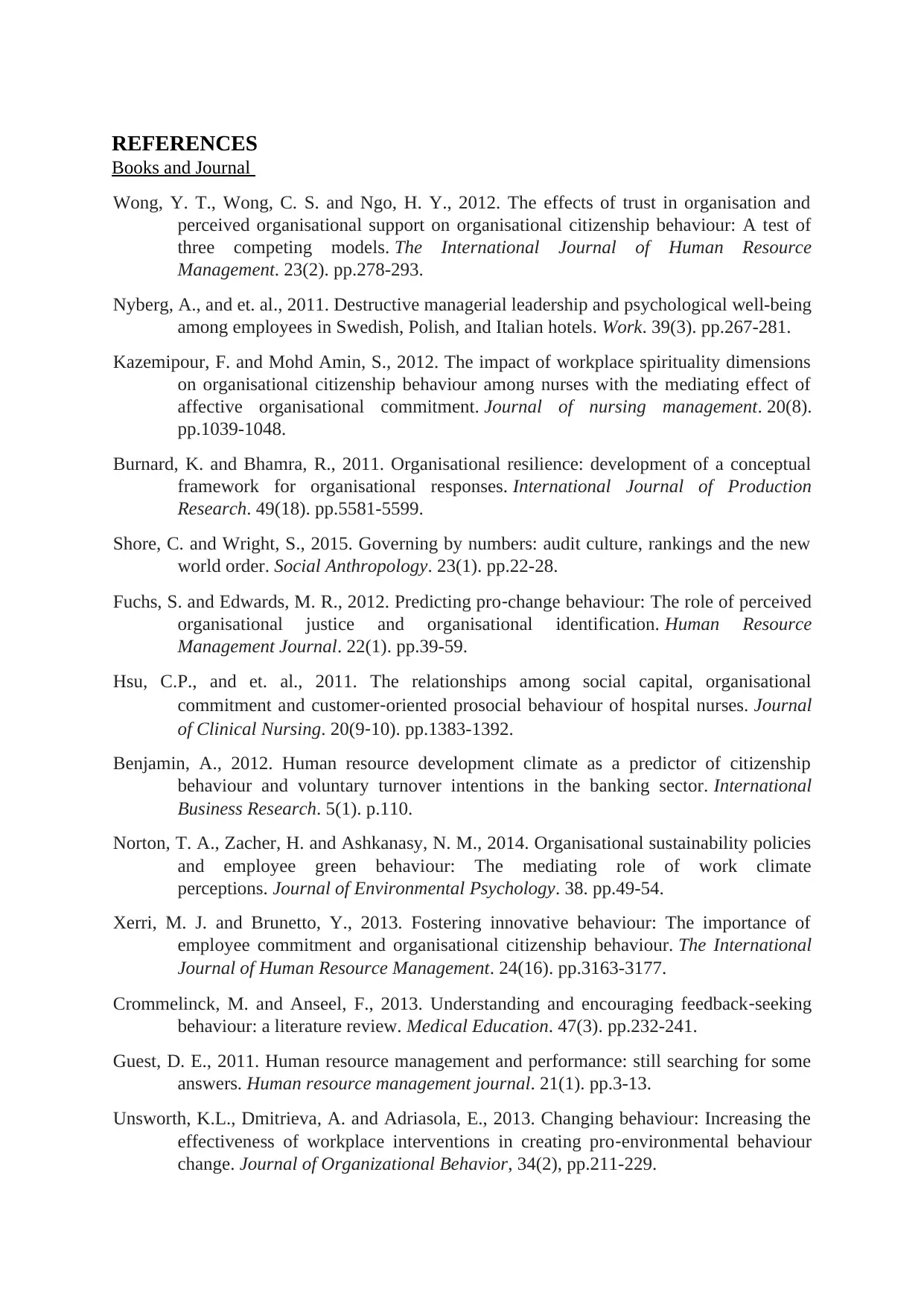
REFERENCES
Books and Journal
Wong, Y. T., Wong, C. S. and Ngo, H. Y., 2012. The effects of trust in organisation and
perceived organisational support on organisational citizenship behaviour: A test of
three competing models. The International Journal of Human Resource
Management. 23(2). pp.278-293.
Nyberg, A., and et. al., 2011. Destructive managerial leadership and psychological well-being
among employees in Swedish, Polish, and Italian hotels. Work. 39(3). pp.267-281.
Kazemipour, F. and Mohd Amin, S., 2012. The impact of workplace spirituality dimensions
on organisational citizenship behaviour among nurses with the mediating effect of
affective organisational commitment. Journal of nursing management. 20(8).
pp.1039-1048.
Burnard, K. and Bhamra, R., 2011. Organisational resilience: development of a conceptual
framework for organisational responses. International Journal of Production
Research. 49(18). pp.5581-5599.
Shore, C. and Wright, S., 2015. Governing by numbers: audit culture, rankings and the new
world order. Social Anthropology. 23(1). pp.22-28.
Fuchs, S. and Edwards, M. R., 2012. Predicting pro‐change behaviour: The role of perceived
organisational justice and organisational identification. Human Resource
Management Journal. 22(1). pp.39-59.
Hsu, C.P., and et. al., 2011. The relationships among social capital, organisational
commitment and customer‐oriented prosocial behaviour of hospital nurses. Journal
of Clinical Nursing. 20(9‐10). pp.1383-1392.
Benjamin, A., 2012. Human resource development climate as a predictor of citizenship
behaviour and voluntary turnover intentions in the banking sector. International
Business Research. 5(1). p.110.
Norton, T. A., Zacher, H. and Ashkanasy, N. M., 2014. Organisational sustainability policies
and employee green behaviour: The mediating role of work climate
perceptions. Journal of Environmental Psychology. 38. pp.49-54.
Xerri, M. J. and Brunetto, Y., 2013. Fostering innovative behaviour: The importance of
employee commitment and organisational citizenship behaviour. The International
Journal of Human Resource Management. 24(16). pp.3163-3177.
Crommelinck, M. and Anseel, F., 2013. Understanding and encouraging feedback‐seeking
behaviour: a literature review. Medical Education. 47(3). pp.232-241.
Guest, D. E., 2011. Human resource management and performance: still searching for some
answers. Human resource management journal. 21(1). pp.3-13.
Unsworth, K.L., Dmitrieva, A. and Adriasola, E., 2013. Changing behaviour: Increasing the
effectiveness of workplace interventions in creating pro‐environmental behaviour
change. Journal of Organizational Behavior, 34(2), pp.211-229.
Books and Journal
Wong, Y. T., Wong, C. S. and Ngo, H. Y., 2012. The effects of trust in organisation and
perceived organisational support on organisational citizenship behaviour: A test of
three competing models. The International Journal of Human Resource
Management. 23(2). pp.278-293.
Nyberg, A., and et. al., 2011. Destructive managerial leadership and psychological well-being
among employees in Swedish, Polish, and Italian hotels. Work. 39(3). pp.267-281.
Kazemipour, F. and Mohd Amin, S., 2012. The impact of workplace spirituality dimensions
on organisational citizenship behaviour among nurses with the mediating effect of
affective organisational commitment. Journal of nursing management. 20(8).
pp.1039-1048.
Burnard, K. and Bhamra, R., 2011. Organisational resilience: development of a conceptual
framework for organisational responses. International Journal of Production
Research. 49(18). pp.5581-5599.
Shore, C. and Wright, S., 2015. Governing by numbers: audit culture, rankings and the new
world order. Social Anthropology. 23(1). pp.22-28.
Fuchs, S. and Edwards, M. R., 2012. Predicting pro‐change behaviour: The role of perceived
organisational justice and organisational identification. Human Resource
Management Journal. 22(1). pp.39-59.
Hsu, C.P., and et. al., 2011. The relationships among social capital, organisational
commitment and customer‐oriented prosocial behaviour of hospital nurses. Journal
of Clinical Nursing. 20(9‐10). pp.1383-1392.
Benjamin, A., 2012. Human resource development climate as a predictor of citizenship
behaviour and voluntary turnover intentions in the banking sector. International
Business Research. 5(1). p.110.
Norton, T. A., Zacher, H. and Ashkanasy, N. M., 2014. Organisational sustainability policies
and employee green behaviour: The mediating role of work climate
perceptions. Journal of Environmental Psychology. 38. pp.49-54.
Xerri, M. J. and Brunetto, Y., 2013. Fostering innovative behaviour: The importance of
employee commitment and organisational citizenship behaviour. The International
Journal of Human Resource Management. 24(16). pp.3163-3177.
Crommelinck, M. and Anseel, F., 2013. Understanding and encouraging feedback‐seeking
behaviour: a literature review. Medical Education. 47(3). pp.232-241.
Guest, D. E., 2011. Human resource management and performance: still searching for some
answers. Human resource management journal. 21(1). pp.3-13.
Unsworth, K.L., Dmitrieva, A. and Adriasola, E., 2013. Changing behaviour: Increasing the
effectiveness of workplace interventions in creating pro‐environmental behaviour
change. Journal of Organizational Behavior, 34(2), pp.211-229.
⊘ This is a preview!⊘
Do you want full access?
Subscribe today to unlock all pages.

Trusted by 1+ million students worldwide
1 out of 13
Related Documents
Your All-in-One AI-Powered Toolkit for Academic Success.
+13062052269
info@desklib.com
Available 24*7 on WhatsApp / Email
![[object Object]](/_next/static/media/star-bottom.7253800d.svg)
Unlock your academic potential
Copyright © 2020–2026 A2Z Services. All Rights Reserved. Developed and managed by ZUCOL.





